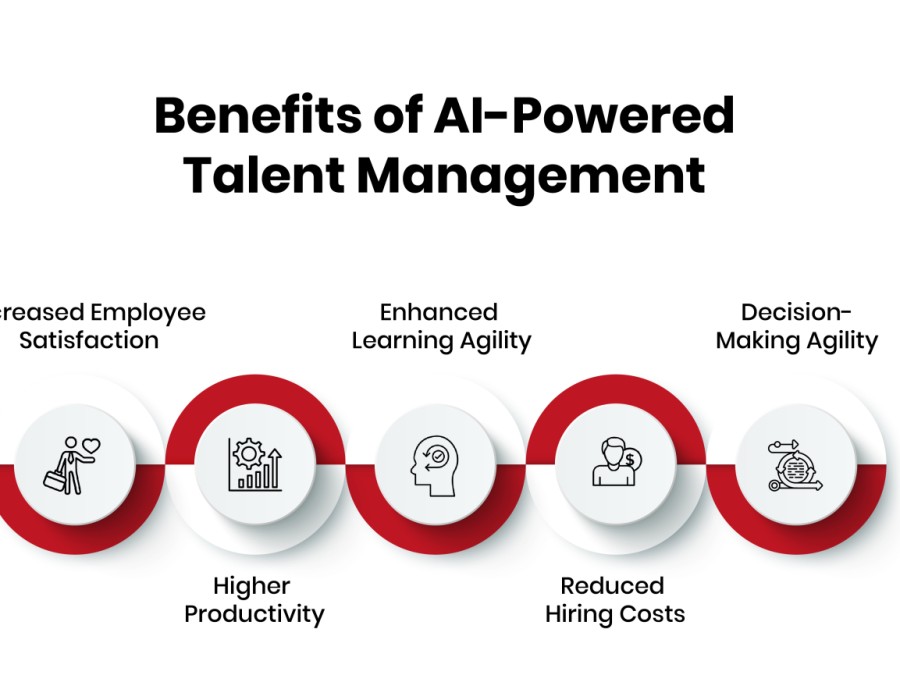HR and business leaders face many challenges in an uncertain market - tightening their budgets, attracting the right talent, identifying skills gaps, and developing the workforce of the future. In today's uncertain market, HR and business leaders face many challenges - tightening budgets, attracting and retaining the right talent, identifying and filling skills gaps, and developing the workforce for the future.
Generative AI will bring even more improvements to talent management. AI is important in many areas, from recruiting and sourcing talent to managing alums. Has your company found the best ways to integrate AI into HR?
Rise of AI in Talent Management
AI's rise in talent management is a transformational journey revolutionizing HR processes. AI is a vital tool in the digital age, affecting recruitment, onboarding and training, performance management, and retention strategies. Gartner data confirms this transformation, showing that 81% of HR leaders use AI solutions to improve process efficiency in their organization. This rapid adoption of AI highlights its crucial role in shaping the future of talent management. It offers unprecedented efficiencies and is strategically advantageous.
How is AI used in Talent Management?
We have witnessed a significant transformation in the work over the last few years. This has led HR leaders and organizations to adopt new technologies and processes, including AI, to help create a more flexible and resilient workforce. Many leading companies are using AI to improve their talent-management processes
- Talent Acquisition
AI can identify the best candidates for an organization by analyzing data from different sources, such as social media profiles and job boards. AI algorithms collect information about candidates' qualifications, skills, and employment history, while NLP techniques match people with appropriate job roles.
- On boarding
The on boarding stage is crucial in the talent journey, as it allows new employees to get to know each other, their job requirements, and company culture. AI can assist by automating administrative work in preparation for the first day and the following weeks. Chat bots can answer questions and guide employees through the first round of forms.
- Talent development
AI ensures that employees constantly learn the skills they need to succeed. Machine learning is a crucial component in optimizing the process. It makes it more efficient and effective while also being personalized.
- Performance Management
After your hiring team has recruited the best people and set up their development and learning plans to ensure their success, the next step will be to measure and manage their employee's performance.
- AI is a vital component of this process.
- Analyzing continuous streams of employee data to identify trends and patterns.
- Feedback is used to make growth recommendations.
- Summary of feedback from various sources and the most critical development areas.
- Engagement and Retention of Talent
AI can help to increase employee engagement by automating employee surveys, exit interviews, and pulse checks. AI, with the help of NLP (natural language processing), can analyze these unstructured interactions to:
- Understanding engagement trends will help you to address any concerns.
- Employee satisfaction is gauged by gauging employee sentiment.
- Predict employee turnover by analyzing patterns.
- Employee engagement can be measured.
- Succession Planning
Investing in your business to prepare for the future means identifying and developing tomorrow's leaders. While some talent acquisition teams might need to hire externally to fill leadership roles, it is more cost-effective for your business to invest in succession planning within its internal org chart.
AI data-driven insights help HR teams identify high-potential candidates who are a good match for leadership positions. The technology analyzes employee performance data and career progression to identify those who demonstrate excellent leadership skills.
AI and Talent Management: Benefits
AI has a profound impact on talent acquisition. CIO statistics show that AI can increase employee retention by 51% and employee satisfaction by 24%. These figures demonstrate the benefits of AI in talent management. It paves the way for an efficient, motivated, and happy workforce.
- Improved Employee Development and Training: AI-powered Learning Management Systems provide customized training programs, bespoke routes, performance gap recommendations, and more significant employee experience.
- Predictive retention strategies: AI-powered predictive retention strategies identify factors contributing to employee attrition and enable proactive measures to increase job satisfaction and reduce turnover.
- Consistency and Scalability: Despite changes in workload, AI-based systems efficiently manage large task volumes, ensuring scalable recruitment and onboarding processes and maintaining consistent service quality.
- Allocation of Resources: AI optimizes the allocation and use of organizational resources, including financial, human, and other resources. It matches employees with appropriate roles, ensuring they have meaningful and relevant assignments.
- Simplify the Recruitment Process: Organizations simplify their recruitment efforts by leveraging AI to match employee skills and potential to position requirements.
Conclusion
The competition to attract top talent in today's corporate environment has increased. To stay competitive, organizations need AI. AI-driven solutions allow organizations to make data-driven decisions. This fosters a healthy workplace for individuals as well as the company.





Comments